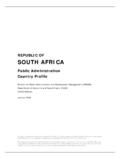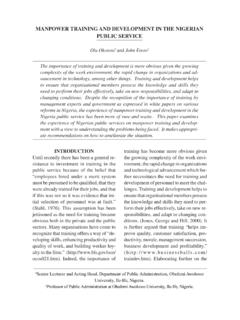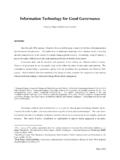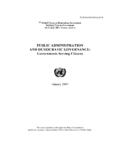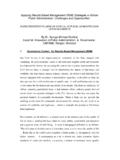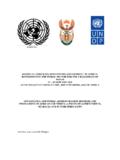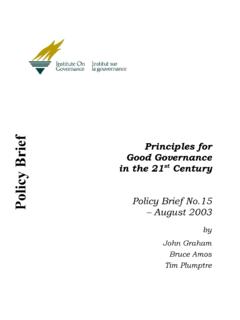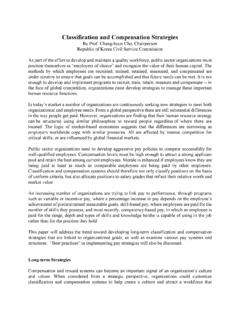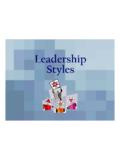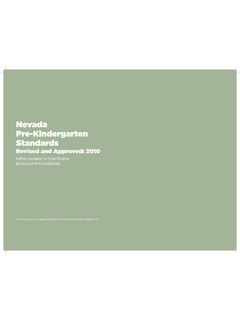Transcription of Pre-Service and In-Service Teacher Education in the
1 Pre-Service and In-Service Teacher Education in the Philippines By Fabian C. Pontiveros, Jr. (Philippine Normal University). Introduction Technology has played an important role in Education . If wisely use, it reduces operational cost while increasing access to quality Education . In the Philippines various agencies or institutions employed technology in planning, implementing, and evaluating educational programs. The use of technology ranges from simple traditional approach to the more sophisticated one-way teleteaching and the more innovative-interactive two-way approaches like teletutorial, online teaching, and telematics. The object of this paper is to present the system and mechanism of Pre-Service and In-Service Teacher Education in the Philippine - with emphasis on the technology employed by the various Education institutions.
2 Education Institutions in the Philippines To be able to understand the present system and mechanism of Teacher Education in the Philippines, it is desirable that the reader be acquainted with the different Education institutions - their roles and contributions -in promoting Teacher Education in the Philippines. These Education institutions, which are considered the pillars of Teacher Education , are working singly and collaboratively to upgrade the standard of Teacher Education in the Philippines. The Philippine Normal University (PNU). A state university that is dedicated to Teacher Education , PNU was founded in 1901 during the American occupation in the Philippines. Its mission is to provide professional, technical, and special instruction for special purposes; and progressive leadership in Education .
3 Considered as the premier Teacher Education institution in the Philippines, PNU is active in both Pre-Service and In-Service Teacher Education . University of the Philippines. National Institute of Science and Mathematics Education (UPNISMED). One of the institutes of the University of the Philippines, UPNISMED is dedicated to science and mathematics Education . UPNISMED, like PNU, is also active in both Pre-Service and In-Service training of teachers but its scope is limited only to science and mathematics educations. University of the Philippines Open University (UPOU). Formerly called the School of Distance Education (SDE) of the University of the Philippines, UPOU is the pioneer of distance Education and online teaching in the Philippines.
4 UPOU is active in post-baccalaureate or life long learning. With the installation of the Integrated Virtual Learning Environment (IVLE, under licensed from National University of Singapore), interactive online teaching has become more real and practical way of reaching learners in distant places. Department of Education , Culture and Sports (DECS). DECS is an agency that is task by the Government of the Philippines (GOP) to provide basic Education to Filipinos. It employs about a million elementary and high school teachers throughout the country. Although its primary role is to provide basic Education , it is however, very active in In-Service training of its teachers. Commission on Higher Education (CHED).
5 Formerly called the Bureau of Higher Education , CHED is task by the government to set up policy and standards for Baccalaureate and post-Baccalaureate degrees. It evaluates curricular programs of all higher Education institutions and issue Permit to Operate to private schools that satisfies the standard. CHED has also the power to cancel permits and effect closure of private schools that violate policy, rules, and guidelines for quality Education . In contrast with the DECS that is active in In-Service training of teachers, the CHED is active in Pre-Service Teacher Education by way of setting up expectations, conducting conferences, consultations, and encouraging linkages or consortium among higher Education institutions.
6 Department of Science & Technology (DOST). This agency is mandated by the government to provide central direction, leadership and coordination of scientific and technological efforts and ensure that the results are geared and utilized in areas of maximum economic and social benefits for the people. As Education is one of the areas of concern of the DOST, this agency created a unit called Science Education Institutes (SEI), which is popularly referred to as SEI-DOST. This unit is in charge of promoting increase awareness in science and technology Education . To achieve this task, SEI-DOST maintains 14 regional centers (one center per region) throughout the country. The leading Teacher Education college or university in the region, whether private or public, is usually chosen as the Learning Center of the SEI-DOST.
7 These learning centers, officially called the Regional Science Teaching Center (RSTC), is in charge of conducting In-Service training to science and math teachers in both the elementary and secondary levels. In-Service trainings conducted by RSTCs throughout the country are done during summer vacations (April to May) to enable the Teacher to attend a continuous training session. Funding from SEI-DOST that is intended for Teacher training is channeled to these learning centers. Books and other instructional materials form part of the training package given by the RSTCs. In addition, SEI-DOST supports elementary and high schools all over the country by way of constructing science laboratories, and donating books and science equipment.
8 Private Colleges and Universities. Private Teacher Education colleges and universities, like the Ateneo system (Ateneo De Manila, Ateneo de Davao, Ateneo de Zamboanga, Xavier University of Cagayan de Oro City), De la Salle University (DLSU), Centro Escolar University (CEU), Silliman University (SU) of Dumaguete City, St. Paul University, University of San Carlos (USC) of Cebu City also conduct Pre-Service and In-Service training of teachers. In-Service training of teachers done by these private institutions are usually funded by the government through its agencies like CHED, DECS, and DOST. Non-Government Organizations (NGOs). Private foundations and companies, like the Foundation for the Upgrading of Standard in Education (FUSE), the ABS-CBN.
9 Foundation, IBM Corporation, Educ Quest, People's Television Network (PTV) and some other NGOs are active in helping promote quality Education . Their involvement ranges from passive (cash or equipment donation) to the more active present roles of collaborating with government institutions in producing quality learning materials. One case in point is the Continuing Science Education for Teachers via Television (CONSTEL) project, which is a joint project of the PTV, FUSE, SEI-DOST, DECS, UPNISMED, and PNU. Another example is the Educational Television (ETV) project of the ABS-CBN Foundation and the DECS. ETV, which is owned and operated by the ABS-CBN Corporation, regularly broadcast educational TV programs in elementary science (SINE'SKWELA), elementary mathematics (MATH-TINIK), elementary history (BAYANI), values Education (HIRAYAMANAWARI), and elementary English (EPOL/APPLE).
10 Schedules for airing these educational programs for the elementary grades coincided with school hours. Thus, school principals or head teachers can prepare class schedules that match the airing schedules of ETV. program. Television monitor has now become a commonplace in many elementary schools throughout the country because of the ETV program of the ABS-CBN and the DECS. Local government units help the school in procuring TV sets. In Mandaluyong City, for example, the city government provided each classroom of the Mandaluyong Elementary School with a TV set. Teacher Training Programs Conducted and their Mechanisms a. PNU Programs. In the Pre-Service component, PNU recently revised its Teacher Education curriculum and added two more courses: IT 1 and IT 2.
